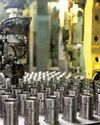
Till 2022-23, India's primary energy mix favoured fossil fuels, with 84 per cent of it coming from coal, oil, and natural gas.
However, with the introduction of renewables, the composition of India's power mix changed significantly, with the share of non-fossil power capacity being 45.4 per cent as of May 2024. India added 13.5 GW of renewable energy capacity in 2023 alone, ranking fourth globally in installed renewable energy capacity, fourth in wind power capacity, and fifth in solar power capacity.
By 2070, India is seeking to triple its renewable energy capacity from its current 170 GW to 500 GW-an ambitious and yet critical target. This transition entails significant costs, not just in terms of capital investments but also in terms of technology, jobs, and other socio-economic aspects. India's Economic Survey this year acknowledged that the price of the energy transition will be too much for most nations, only to get worse going forward.
At the same time, the transition also brings significant opportunities beyond cost savings and environmental improvements. What are the costs of transitioning to this cleaner future, and how does it fit in with India's balanced approach to economic growth and building climate resilience? India is one of the fastest-growing economies, poised to become the third largest in the world, and yet our per capita income, a key indicator of economic prosperity, remains much lower compared to other developing bloc peers.
This story is from the {{IssueName}} edition of {{MagazineName}}.
Start your 7-day Magzter GOLD free trial to access thousands of curated premium stories, and 9,000+ magazines and newspapers.
Already a subscriber ? Sign In
This story is from the {{IssueName}} edition of {{MagazineName}}.
Start your 7-day Magzter GOLD free trial to access thousands of curated premium stories, and 9,000+ magazines and newspapers.
Already a subscriber? Sign In

MEMORIES & IMPRESSIONS
Ratan Tata was an exceptional human being. He was a visionary leader, esteemed industrialist, and a humanitarian, who left an indelible mark on India and the world.

The Robotaxi Market
The robotaxi market is shaping up to be a high-stakes battleground as tech giants and automakers race to transform urban mobility.

And the Nobel Prize Goes to AI
The recent Nobel Prize T awards to AI pioneers affiliated with Google have sparked a broader conversation about Big Tech's influence on research and the limitations of traditional prize categories.

Ola Electrified
Once considered a trailblazer in India’s electric vehicle (EV) ecosystem, Bhavish Aggarwal’s Ola Electric now faces a major accountability crisis.

Sharp Slide in Industrial Output on Eve of Deepavali
India’s index of industrial production (IIP) saw a sharp reversal in August, contracting by 0.1 per cent, in stark contrast to the 4.7 per cent growth in July, mostly because of significant contractions in mining and electricity generation.

Heralding the Solar Era with Sustainable Electrification
RAJEEV KASHYAP on the economics of solar power, the hurdles in scaling it, and much more

A WELL-GREASED MACHINE
The OmniBook X14 laptop runs on first-generation Snapdragon X Elite, which bets big on Al-enabled productivity and battery life, but falls short when it comes to overall experience, says Deep Majumdar

DO NOT LETA HEALTH CRISIS RUIN YOUR FINANCIAL HEALTH
For a family of four living in a metro, it is recommended to opt for a family floater health insurance plan with a sum insured of at least Rs 15-20 lakh

Disruption Ahead: Beyond Organisation Charts and Structures
ALBERT EINSTEIN FAMOUSLY said, “We cannot solve our problems with the same thinking we used when we created them.

Dr. Rahul Shivajirao Kadam: A Visionary Leader Blending Sustainability, Innovation, And Social Empowerment
We are on the stage of global warming, and these technologies not only help prevent further damage but also leave behind a better environment for future generations.